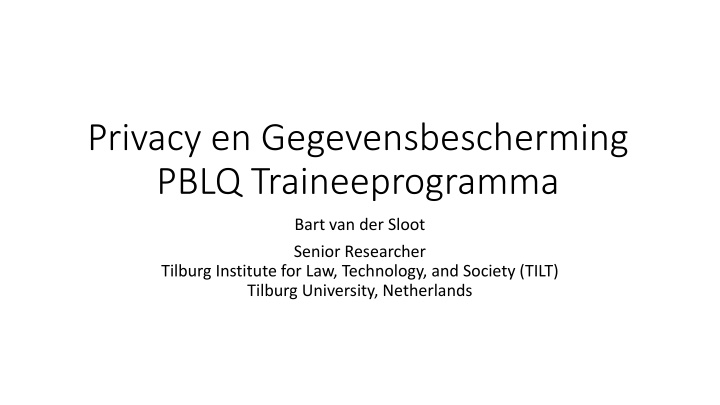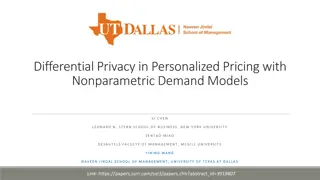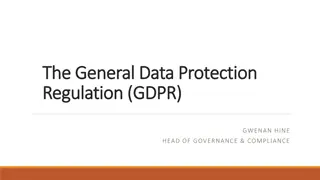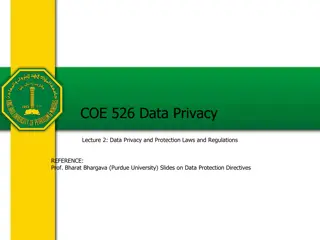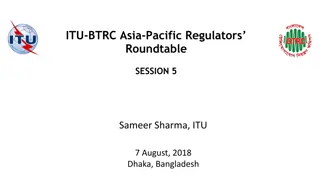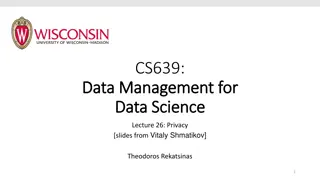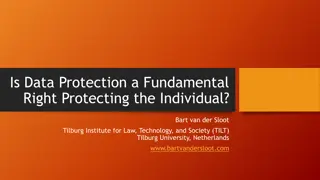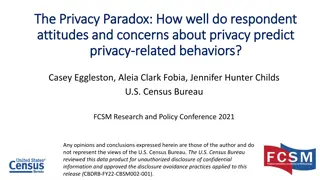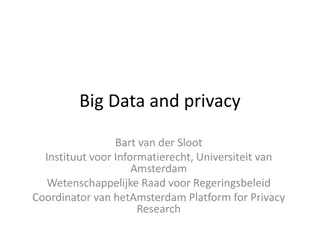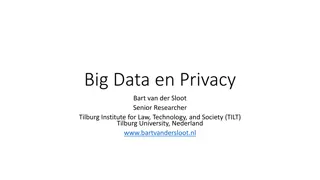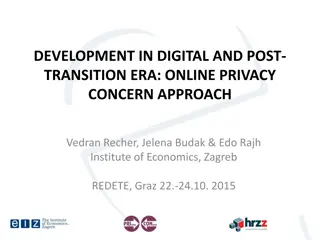Privacy and Data Protection in the Digital Age
Bart van der Sloot, a Senior Researcher at Tilburg Institute for Law, Technology, and Society, specializes in Privacy and Big Data, focusing on issues such as internet intermediary liability, data protection, and internet regulation. With expertise in the General Data Protection Regulation, international data flows, and data breaches, Bart's work highlights the importance of privacy rights in today's digital world. His contributions to the field include research, editing academic publications, and involvement in privacy-focused organizations and conferences.
Download Presentation

Please find below an Image/Link to download the presentation.
The content on the website is provided AS IS for your information and personal use only. It may not be sold, licensed, or shared on other websites without obtaining consent from the author.If you encounter any issues during the download, it is possible that the publisher has removed the file from their server.
You are allowed to download the files provided on this website for personal or commercial use, subject to the condition that they are used lawfully. All files are the property of their respective owners.
The content on the website is provided AS IS for your information and personal use only. It may not be sold, licensed, or shared on other websites without obtaining consent from the author.
E N D
Presentation Transcript
Privacy en Gegevensbescherming PBLQ Traineeprogramma Bart van der Sloot Senior Researcher Tilburg Institute for Law, Technology, and Society (TILT) Tilburg University, Netherlands
Overzicht (1) Kort interactief debat (2) Algemene Verordening Gegevensbescherming (3) Pauze (4) Kort interactief debat (5) Big Data, Open Data en Hergebruik (6) Kort interactief debat (7) Aansprakelijkheid internet intermediairs (8) Afronding
Bart van der Sloot Specialisatie op het gebied van Privacy en Big Data, de aansprakelijkheid van internet intermediairs, gegevensbescherming en internetregulering. Actuele kernpunten zijn de onlangs door de Europese Unie aangenomen Algemene Verordening Gegevensbescherming, internationale gegevensstromen, met name tussen Europa en de Verenigde Staten, en datalekken. Heeft recht en filosofie gestudeerd in Nederland en Itali en heeft tevens met succes het Honoursprogramma van de Radboud Universiteit afgerond. Werkt momenteel bij het Tilburg Institute for Law, Technology, and Society van de Tilburg University. Voorheen gewerkt bij het Instituut voor Informatierecht, Universiteit van Amsterdam. Ook part-time gewerkt bij de Wetenschappelijk Raad voor Regeringsbeleid (WRR) (onderdeel van het ministerie van Algemene Zaken) aan een rapport over de regulering van Big Data in verband met veiligheid en privacy. In dat kader was hij ook de eerste editor van een wetenschappelijk boek met gastbijdrages van vooraanstaande internationale wetenschappers en de eerste auteur van een internationaal, rechtsvergelijkend onderzoek naar de regulering van Big Data. General editor van het internationale privacy tijdschrift European Data Protection Law Review. Proefschrift over subjectieve rechten in de Big Data wereld. Betrokken bij het Privacy and Identity Lab en co rdinator van het Amsterdam Platform for Privacy Research (APPR) en voorheen van de Amsterdam Privacy Conference 2012 en de Amsterdam Privacy Conference 2015. Meer informatie op www.bartvandersloot.nl
ARTIKEL 8 EVRM Recht op eerbiediging van priv -, familie- en gezinsleven 1. Een ieder heeft recht op respect voor zijn priv leven, zijn familie- en gezinsleven, zijn woning en zijn correspondentie. 2. Geen inmenging van enig openbaar gezag is toegestaan in de uitoefening van dit recht, dan voor zover bij de wet is voorzien en in een democratische samenleving noodzakelijk is in het belang van de nationale veiligheid, de openbare veiligheid of het economisch welzijn van het land, het voorkomen van wanordelijkheden en strafbare feiten, de bescherming van de gezondheid of de goede zeden of voor de bescherming van de rechten en vrijheden van anderen.
Handvest voor de Grondrechten van de Europese Unie Artikel 7 Eerbiediging van het priv -leven en het familie- en gezinsleven Eenieder heeft recht op eerbiediging van zijn priv -leven, zijn familie- en gezinsleven, zijn woning en zijn communicatie. Artikel 8 Bescherming van persoonsgegevens 1. Eenieder heeft recht op bescherming van de hem betreffende persoonsgegevens. 2. Deze gegevens moeten eerlijk worden verwerkt, voor bepaalde doeleinden en met toestemming van de betrokkene of op basis van een andere gerechtvaardigde grondslag waarin de wet voorziet. Eenieder heeft recht op toegang tot de over hem verzamelde gegevens en op rectificatie daarvan. 3. Een onafhankelijke autoriteit ziet toe op de naleving van deze regels.
Privacy en data protection Domain Relations Background Character Privacy Primarily regards the private sphere Primarily regards vertical relationships (citizen state) Rise of nation states Control on the use of power & duties of care Or .. Data Protectio n Regards both the private and the public sphere Primarily regards horizontal relationships (citizen - business) Technological developments Control on the use of power & duties of care Or ..
TREATY ESTABLISHING THE EUROPEAN COMMUNITY Article 100a 1. By way of derogation from Article 100 and save where otherwise provided in this Treaty, the following provisions shall apply for the achievement of the objectives set out in Article 7a. The Council shall, acting in accordance with the procedure referred to in Article 189b and after consulting the Economic and Social Committee, adopt the measures for the approximation of the provisions laid down by law, regulation or administrative action in Member States which have as their object the establishment and functioning of the internal market. (27)() 2. Paragraph 1 shall not apply to fiscal provisions, to those relating to the free movement of persons nor to those relating to the rights and interests of employed persons. 3. The Commission, in its proposals envisaged in paragraph 1 concerning health, safety, environmental protection and consumer protection, will take as a base a high level of protection. 4. If, after the adoption of a harmonization measure by the Council acting by a qualified majority, a Member State deems it necessary to apply national provisions on grounds of major needs referred to in Article 36, or relating to protection of the environment or the working environment, it shall notify the Commission of these provisions. The Commission shall confirm the provisions involved after having verified that they are not a means of arbitrary discrimination or a disguised restriction on trade between Member States. By way of derogation from the procedure laid down in Articles 169 and 170, the Commission or any Member State may bring the matter directly before the Court of Justice if it considers that another Member State is making improper use of the powers provided for in this Article. 5. The harmonization measures referred to above shall, in appropriate cases, include a safeguard clause authorizing the Member States to take, for one or more of the non- economic reasons referred to in Article 36, provisional measures subject to a Community control procedure.
Article 16 Treaty on the Functioning of the European Union 1. Everyone has the right to the protection of personal data concerning them. 2. The European Parliament and the Council, acting in accordance with the ordinary legislative procedure, shall lay down the rules relating to the protection of individuals with regard to the processing of personal data by Union institutions, bodies, offices and agencies, and by the Member States when carrying out activities which fall within the scope of Union law, and the rules relating to the free movement of such data. Compliance with these rules shall be subject to the control of independent authorities. The rules adopted on the basis of this Article shall be without prejudice to the specific rules laid down in Article 39 of the Treaty on European Union.
Recente rechtszaken ECJ Coty Digital Rights Ireland Weltimo Tele2 Breyer Schrems
Data Protection Directive No specific duties, but general standards of care Data collection, use and proecessing should be necessary and propotioniate, should have a clear and legitimate goal Technical and organisational measures Personal data should be correct, complete and up to date Transparancy
Data Protection Directive Only three marginal subjective rights Right to acces Richt to information Right to rectification if data are not processed according to the data protection rules. Richt to object At least in the cases referred to in Article 7 (e) and (f), to object at any time on compelling legitimate grounds relating to his particular situation to the processing of data relating to him Automated individual decisions which produces legal effects concerning him or significantly affects him and which is based solely on automated processing of data intended to evaluate certain personal aspects relating to him
Data Protection Directive Only a marginal role for supervisory authority Limmited possibilities for remedies, liability and sanctions > left to national Member States Notification requirement is mosly ignored Sector specific codes of conduct are very few and far between European collection of CBP s, the Working Party 29, may only adopt non-binding advisory opinions
General Data Protection Regulation Rights Right to acces, object and resist automatic profiling have been elaborated on Data portability Right to be forgotten Protection against profiling
General Data Protection Regulation Duties All original duties have been retained + elaborated on Accountability duty Documentation Risk assessments Data protection officer Privacy by design / by default Reversal of the burden of proof for consent Verification duty for consent of children Data breach notification
General Data Protection Regulation Enforcement Harmonization of the rules: Regulation Commission EDPB Harmonization of enforcement: One stop shop/cooperation DPAs Elaborated tasks and powers DPAs Sanctions and liability widened
Article 83 General conditions for imposing administrative fines 5. Infringements of the following provisions shall, in accordance with paragraph 2, be subject to administrative fines up to 20 000 000 EUR, or in the case of an undertaking, up to 4 % of the total worldwide annual turnover of the preceding financial year, whichever is higher: (a) the basic principles for processing, including conditions for consent, pursuant to Articles 5, 6, 7 and 9; (b) the data subjects' rights pursuant to Articles 12 to 22; (c) the transfers of personal data to a recipient in a third country or an international organisation pursuant to Articles 44 to 49; (d) any obligations pursuant to Member State law adopted under Chapter IX; (e) non-compliance with an order or a temporary or definitive limitation on processing or the suspension of data flows by the supervisory authority pursuant to Article 58(2) or failure to provide access in violation of Article 58(1). 6.Non-compliance with an order by the supervisory authority as referred to in Article 58(2) shall, in accordance with paragraph 2 of this Article, be subject to administrative fines up to 20 000 000 EUR, or in the case of an undertaking, up to 4 % of the total worldwide annual turnover of the preceding financial year, whichever is higher.
Defintion and delineation of Big Data The Gartner Report focusses on three matters when describing Big Data: increasing volume (amount of data), velocity (speed of data processing), and variety (range of data types and sources). This is also called the 3v model or 3v theory Authors have added new V s such as Value (Dijcks, 2012; Dumbill, 2013), Variability (Hopkins & Evelson, 2011; Tech America Foundation, 2012), Veracity (IBM, 2015) and Virtual (Zikopoulos et al 11; Akerkar et al 2015).
Defintion and delineation of Big Data The Article 29 Working Party: Big Data is a term which refers to the enormous increase in access to and automated use of information. It refers to the gigantic amounts of digital data controlled by companies, authorities and other large organizations which are subjected to extensive analysis based on the use of algorithms. Big Data may be used to identify general trends and correlations, but it can also be used such that it affects individuals directly. The European Data Protection Supervisor: Big data means large amounts of different types of data produced at high speed from multiple sources, whose handling and analysis require new and more powerful processors and algorithms. Not all of these data are personal, but many players in the digital economy increasingly rely on the large scale collection of and trade in personal information. As well as benefits, these growing markets pose specific risks to individual's rights to privacy and to data protection.
Defintion and delineation of Big Data The Estonian DPA describes Big Data as collected and processed open datasets, which are defined by quantity, plurality of data formats and data origination and processing speed. The Luxembourg DPA: Big Data stems from the collection of large structured or unstructured datasets, the possible merger of such datasets as well as the analysis of these data through computer algorithms. It usually refers to datasets which cannot be stored, managed and analysed with average technical means due to their size. Personal data can also be a part of Big Data but Big Data usually extends beyond that, containing aggregated and anonymous data. The Dutch DPA: Big Data is all about collecting as much information as possible ; storing it in ever larger databases ; combining data that is collected for different purposes ; and applying algorithms to find correlations and unexpected new information. The Slovenian DPA: Big Data is a broad term for processing of large amounts of different types of data, including personal data, acquired from multiple sources in various formats. Big Data revolves around predictive analytics acquiring new knowledge from large data sets which requires new and more powerful processing applications. The UK DPA: repurposing data; using algorithms to find correlations in datasets rather than constructing traditional queries; and bringing together data from a variety of sources, including structured and unstructured data. The Swedish DPA argues that the concept is used for situations where large amounts of data are gathered in order to be made available for different purposes, not always precisely determined in advance.
Defintion and delineation of Big Data Umbrella term Open Data: Lots of Big Data initiatives are linked to Open Data. Open Data is the idea, as the name suggests, that (government) data should be public. Traditionally, it is linked to the strive for transparency in the public sector and for more control over government power by media and/or citizens. In particular, the Estonian DPA is very explicit about the relationship between Open Data and Big Data. Big Data is defined as collected and processed open datasets, which are defined by quantity, plurality of data formats and data origination and processing speed . The desk research also shows a clear link between the two concepts in some countries, such as Australia, France, Japan and the United Kingdom.
Defintion and delineation of Big Data Re-Use: Linked to Open Data is the idea of re-use of data. Yet there is one important difference. While Open Data traditionally concerned the transparency of and control on government power, there re-use of (government) data is specifically intended to promote the commercial exploitation of these data by businesses and private parties. The re-use of Public Sector Information is stimulated through the PSI Directive of the European Union. But more in general, re-use refers to the idea that data can be used for another purpose than for which they were originally collected. The Norwegian DPA, inter alia, has suggested the relationship between Big Data and the re-use of data. The Norwegians use the definition of the Working Group 29, but also add what in our opinion is the key aspect of Big Data, namely that it is about the compilation of data from several different sources. In other words, it is not just the volume in itself that is of interest, but the fact that secondary value is derived from the data through reuse and analysis. The desk research also showed a link between the two concepts. In France, for example, Big Data is primarily seen as a phenomenon based on the re-use of data for new purposes and on the combination of different data and datasets. Directive 2003/98/EC of the European Parliament and of the Council of 17 November 2003 on the re-use of public sector information. Directive 2013/37/EU of the European Parliament and the Council of 26 June 2013 amending Directive 2003/98/EC on the re-use of public sector information.
Defintion and delineation of Big Data Internet of things: The term the Internet of Things refers to the idea that more and more things are connected to the Internet. This may include cars, lampposts, refrigerators, pants, or whatever object. This allows for the development of smart devices - for example, a refrigerator that records that the milk is out and automatically orders new. By providing all objects with a sensor, large quantities of data can be collected. Therefore, Big Data and the Internet of Things are often mentioned in the same breath. An example would be the DPA of the United Kingdom noting that big data may involve not only data that has been consciously provided by data subjects, but also personal data that has been observed (e.g. from Internet of Things devices), derived from other data or inferred through analytics and profiling.
Defintion and delineation of Big Data Smart: Because of the applications of the internet of things and the constantly communicating devices and computers, the development of smart products and services has spiralled. Examples of such developments are smart cities, smart devices and smart robots. The desk research indicates that in a number of countries, a link is made between such developments and Big Data systems, for example the United States and the United Kingdom. Also, the DPA from Luxembourg emphasizes the relationship with smart systems, such as smart metering. At a national level, a system of smart metering for electricity and gas has been launched. The project is however still in a testing phase. - The CNPD has not issued any decisions, reports or opinions that are directly dealing with Big Data. The Commission has however issued an opinion in a related matter, namely with regard to the problematic raised by smart metering. In 2013, the CNPD issued an opinion on smart metering. The main argument of the opinion highlights the necessity to clearly define the purposes of the data processing as well as the retention periods of the data related to smart metering.
Defintion and delineation of Big Data Profiling: A term that is often associated with Big Data and is sometimes included as part of the definition of Big Data is profiling. Because increasingly large data sets are collected and analysed, the conclusions and correlations are mostly formulated on a general or group level. This mainly involves statistical correlations, sometimes of a predictive nature. Germany is developing new laws on profiling and a number of DPAs emphasize the relationship of Big Data with profiling, such as the DPA of Netherlands, Slovenia, the UK and Belgium. The latter argues: The general data protection law applies, and we expect that de new data protection regulation will be able to provide a partial answer (profiling) to big data issues (legal interpretation of the EU legal framework).
Defintion and delineation of Big Data Algoritmes: A term that recurs in very many definitions of Big Data is algorithms. This applies to the definition of Working Party 29, the EDPS and a number of DPAs such as that of Luxembourg, the Netherlands and the UK. A number of countries also have a special focus on algorithms. In Australia, a Program Protocol applies to certain cases a report may be issues in which the following elements are contained: a description of the data, a specification of each matchings algorithm, the expected risks and how they will be addressed, the means for checking the integrity and the security measures used.
Defintion and delineation of Big Data Cloud Computing: Cloud computing is also often associated with Big Data processes. In particular, in China and Israel, the two terms are often connected to each other. For example, the Chinese vice-premier stressed that the government wants to make better use of technologies like Big Data and cloud computing to support innovation; according to the prime minister mobile Internet, cloud computing, Big Data and the Internet of Things are integrated with production processes, and will thus be an important engine for economic growth. In Israel, the plan is for the army to have a cloud where all data are stored in 2015 - there is even talk of a "combat computing cloud", a data center that will make available different tools to forces on the ground. Also, some DPAs suggest a relationship between cloud computing and Big Data; the Slovenian DPA states, for example, that new concepts and paradigms, such as cloud computing or big data should not lower or undermine the current levels of data protection as a fundamental human right.
Use in practice of Big Data In the United States, more than $ 200 million was reserved for a research and development initiative for Big Data, to be spent by six federal government departments;the army invested the most in Big Data projects, namely $ 250 million;$ 160 million was invested in a smart cities initiative, investing in 25 collaborations focused on data usage. In the United Kingdom, 159 million was spent on high-quality computer and network infrastructure,there are 189 million in investments to support Big Data and to develop the data infrastructure of the UK and 10.7 million will be spent on a center for Big Data and space technologies.In addition, 42 million will be spent on the Alan Turing Institute for analysis and application of big data, 50 million for 'The Digital Catapult', where researchers and industry are brought together to come up with innovative products and lastly, the Minister of Universities and Science in February 2014 announced a new investment of 73 million in Big Data. This is used for bioinformatics, open data projects, research and the use of environmental data. In South-Africa, the government has invested 2 billion South-African Rand, approximately 126.8 million, in the Square Kilometre Array (SKA) project. A project which revolves around very large data sets. In France, seven research projects related to Big Data were given 11.5 million. In Germany, the Ministry of Education and Research invested 10 million in Big Data research institutes and 20 million in Big Data research; this ministry will also invest approximately 6.4 million in the project Abida, a four-year interdisciplinary research project on the social and economic effects of large data sets.
Use in practice of Big Data What are the areas in which Big Data is (presumably) used? Internet companies: advertisements Health care sector: total genome analysis Taxs authorities: risk profiles Police: predictive policing Intelligence services: terror prevention
Use in practice of Big Data Primarily in the private sector, to a lesser extent in the public sector, especially security related The Hungarian DPA, for example, emphasizes that in Hungarian business sphere more and more enterprises such as banks, supermarkets, media and telecommunication companies use and take advantage of the possibilities in Big Data. The DPA from Luxembourg holds: To our knowledge there are no prominent examples of the use of Big Data in the law enforcement sector or by police or intelligence services in Luxembourg. There are however other actors which deal with Big Data. The Norwegian DPA argues along the same line: There are, as far as we know, no usage of big data within the law enforcement sector in Norway. In 2014, the intelligence service addressed in a public speech the need to use big data techniques in order to combat terrorism more efficiently. However, politicians across all parties reacted very negatively to this request and no formal request to use such techniques has since been launched by the intelligence service. The companies that are most advanced when it comes to using big data may be found within the telecom (eg. Telenor) and media (eg. Schibsted and Cxence) sector. The tax and customs authorities have also initiated projects in which they look at how big data can be used to enhance the efficiency of their work. The Norwegian DPA continues: At the Norwegian DPA we are currently looking into how it affects our privacy when personal data is more and more turning into an valuable commodity in all sectors of the economy. We are writing a report on how big data is used within the advertising industry, and how the use of automated, personalised marketing triggers an enourmous appetite for and exchange of personal data.
Use in practice of Big Data The Slovenian DPA emphasizes: We have thus far not seen prominent examples of the use of Big Data in our country. To our knowledge Big Data applications are particularly of interest in insurance, banking and electronic communications sector, mostly to battle fraud and other illegal practices. Another important field is scientific and statistical research. Law enforcement use is to our knowledge currently at development stages (e.g. in the case of processing Passenger Name Records), whereas information about the use of Big Data at intelligence services is either not available or of confidential nature. The Swedish DPA holds: We have not carried out any specific supervision related to the concept Big Data and do not have any statistics or specific information on how this is used. In our opinion, the law enforcement sector does not use Big Data. Their personal data processing is strictly regulated in terms of collection of data, limited purposes etc. Finally, the DPA from the United Kingdom states: We have not carried out a comprehensive market assessment of big data but, from our contacts with business and our desk research, our impression is that the take up of big data is still at a relatively early stage in the UK. Nevertheless, we know that companies are actively investigating the potential of big data, and there are some examples of big data in practice, such as the use of telematics in motor insurance, the use of mobile phone location data for market research, and the availability of data from the Twitter firehose for analytics. We do not have any specific information on the use of big data in law enforcement or security. The UK Data Protection Act includes a wide-ranging exemption from the data protection principles where it is required for safeguarding national security.
Social and ethical dangers of Big Data Power imbalance & Mathew effect: Individuals, as a general rule, have limited power to influence how large corporations behave. Extensive use of Big Data analytics may increase the imbalance between large corporations on the one hand and the consumers on the other. It is the companies that collect personal data that extract the ever-growing value inherent in the analysis and processing of such information, and not the individuals who submit the information. Rather, the transaction may be to the consumer's disadvantage in the sense that it can ex- pose them to potential future vulnerabilities (for example, with regard to employment opportunities, bank loans, or health insurance options). Data determinism and discrimination: The Big data-mindset is based on the assumption that the more data you collect and have access to, the better, more reasoned and accurate decisions you will be able to make. But collection of more data may not necessarily entail more knowledge. More data may also result in more confusion and more false positives. Extensive use of automated decisions and prediction analyses may have adverse consequences for individuals. Algorithms are not neutral, but reflect choices, among others, about data, connections, inferences, interpretations, and thresholds for inclusion that advances a specific purpose. 32 Big Data may hence consolidate existing prejudices and stereotyping, as well as reinforce social exclusion and stratification. Use of correlation analysis may also yield completely incorrect results for individuals. Correlation is often mistaken for causality. If the analyses show that individuals who like X have an eighty per cent probability rating of being exposed to Y, it is impossible to conclude that this will occur in 100 per cent of the cases. Thus, discrimination on the basis of statistical analysis may become a privacy issue. A development where more and more decisions in society are based on use of algorithms may result in a Dictatorship of Data , where we are no longer judged on the basis of our actual actions, but on the basis of what the data indicate will be our probable actions.
Social and ethical dangers of Big Data The Chilling effect: If there is a development where credit scores and insurance premiums are based solely or primarily on the information we leave behind in various contexts on the Internet and in other arenas in our daily life, this may be of consequence for the protection of privacy and how we behave. In ten years, our children may not be able to obtain insurance coverage because we disclosed in a social network that we are predisposed for a genetic disorder, for example. This may result in us exercising restraint when we participate in society at large, or that we actively adapt our behaviour both online and elsewhere. We may fear that the tracks we leave behind in various contexts may have an impact on future decisions, such as the possibility of finding work, obtaining loans, insurance, etc. It may even deter users from seeking out alternative points of view online for fear of being identified, profiled or discovered. With regard to the authorities' use of Big Data, uncertainty concerning which data sources are used for collecting information and how they are utilised may threaten our confidence in the authorities. This in turn may have a negative impact on the very foundation for an open and healthy democracy. Poor protection of our privacy may weaken democracy as citizens limit their participation in open exchanges of viewpoints. In a worst case scenario, extensive use of Big Data may have a chilling effect on freedom of expression if the premises for such use are not revealed and cannot be independently verified. Echo chambers: Personalisation of the web, with customised media and news services based on the individual's web behaviour, will also have an impact on the framework conditions for public debates and exchanges of ideas important premises for a healthy democracy. This is not primarily a privacy challenge, but constitutes a challenge for society at large. The danger associated with so-called echo chambers or filter bubbles is that the population will only be exposed to content which confirms their own attitudes and values. The exchange of ideas and viewpoints may be curbed when individuals are more rarely exposed to viewpoints different from their own. Transparency paradox: The citizen is becoming more and more transparent to the government, while the government is becoming more an more in-transparent to the citizen.
Juridical challenges of Big Data: Purpose Article 6 Data protection Directive 1. Member States shall provide that personal data must be: (a) processed fairly and lawfully;
Juridical challenges of Big Data: Purpose Article 7 Member States shall provide that personal data may be processed only if: (a) the data subject has unambiguously given his consent; or (b) processing is necessary for the performance of a contract to which the data subject is party or in order to take steps at the request of the data subject prior to entering into a contract; or (c) processing is necessary for compliance with a legal obligation to which the controller is subject; or (d) processing is necessary in order to protect the vital interests of the data subject; or (e) processing is necessary for the performance of a task carried out in the public interest or in the exercise of official authority vested in the controller or in a third party to whom the data are disclosed; or (f) processing is necessary for the purposes of the legitimate interests pursued by the controller or by the third party or parties to whom the data are disclosed, except where such interests are overridden by the interests for fundamental rights and freedoms of the data subject which require protection under Article 1 (1).
Juridical challenges of Big Data: Purpose Article 8 The processing of special categories of data 1. Member States shall prohibit the processing of personal data revealing racial or ethnic origin, political opinions, religious or philosophical beliefs, trade-union membership, and the processing of data concerning health or sex life. 2. Paragraph 1 shall not apply where: (a) the data subject has given his explicit consent to the processing of those data, except where the laws of the Member State provide that the prohibition referred to in paragraph 1 may not be lifted by the data subject's giving his consent; or (b) processing is necessary for the purposes of carrying out the obligations and specific rights of the controller in the field of employment law in so far as it is authorized by national law providing for adequate safeguards; or (c) processing is necessary to protect the vital interests of the data subject or of another person where the data subject is physically or legally incapable of giving his consent; or (d) processing is carried out in the course of its legitimate activities with appropriate guarantees by a foundation, association or any other non-profit-seeking body with a political, philosophical, religious or trade-union aim and on condition that the processing relates solely to the members of the body or to persons who have regular contact with it in connection with its purposes and that the data are not disclosed to a third party without the consent of the data subjects; or (e) the processing relates to data which are manifestly made public by the data subject or is necessary for the establishment, exercise or defence of legal claims.
Juridical challenges of Big Data: Purpose limitation Article 6 1. Member States shall provide that personal data must be: (b) collected for specified, explicit and legitimate purposes and not further processed in a way incompatible with those purposes. Further processing of data for historical, statistical or scientific purposes shall not be considered as incompatible provided that Member States provide appropriate safeguards;
Juridical challenges of Big Data: Purpose limitation For example, the DPA of Luxembourg emphasises: From a data protection point of view it can raise many concerns, when it contains personal data, such as the respect of data subjects rights - for example in the context of data mining - and their ability to exercise control over the personal data or the respect fundamental principles of data protection such as that of data minimization or purpose limitation. The definition of Big Data of the Dutch DPA contains, among other elements, combining data that is collected for different purposes and it also holds: Our key concern is that data protection should be about surprise minimisation, while big data entails the risk of surprise maximation. There is a real risk that those who are involved in the development and use of Big Data are ignoring the basic principles of purpose limitation, data minimisation and transparency. And an additional frightening fact is that the statistical information, even if the data used is properly anonymised, can lead to such precise results that it essentially constitutes re-identification. The Norwegian DPA states: In other words, it is not just the volume in itself that is of interest, but the fact that secondary value is derived from the data through reuse and analysis. This aspect of Big Data, and the consequences it has, is in our opinion the most challenging aspect from a privacy perspective. Finally, the Swedish DPA states about Big Data: As we see it, the concept is used for situations where large amounts of data are gathered in order to be made available for different purposes, not always precisely determined in advance.
Juridical challenges of Big Data: Data minimization Article 6 1. Member States shall provide that personal data must be: (b) collected for specified, explicit and legitimate purposes and not further processed in a way incompatible with those purposes. Further processing of data for historical, statistical or scientific purposes shall not be considered as incompatible provided that Member States provide appropriate safeguards; (c) adequate, relevant and not excessive in relation to the purposes for which they are collected and/or further processed; (e) kept in a form which permits identification of data subjects for no longer than is necessary for the purposes for which the data were collected or for which they are further processed. Member States shall lay down appropriate safeguards for personal data stored for longer periods for historical, statistical or scientific use.
Juridical challenges of Big Data: Data minimization Almost all DPAs mention this principle when it comes to the dangers of Big Data. The DPA from Luxembourg, inter alia, refers to a decision in which it stressed the importance of a retention period for data storage. The Dutch DPA summarizes the tension between Big Data and data minimization in very clear words: Big Data is all about collecting as much information as possible .
Juridical challenges of Big Data: Technical and organizational measures Article 16 - Confidentiality of processing Any person acting under the authority of the controller or of the processor, including the processor himself, who has access to personal data must not process them except on instructions from the controller, unless he is required to do so by law. Article 17 - Security of processing 1. Member States shall provide that the controller must implement appropriate technical and organizational measures to protect personal data against accidental or unlawful destruction or accidental loss, alteration, unauthorized disclosure or access, in particular where the processing involves the transmission of data over a network, and against all other unlawful forms of processing. Having regard to the state of the art and the cost of their implementation, such measures shall ensure a level of security appropriate to the risks represented by the processing and the nature of the data to be protected. 2. The Member States shall provide that the controller must, where processing is carried out on his behalf, choose a processor providing sufficient guarantees in respect of the technical security measures and organizational measures governing the processing to be carried out, and must ensure compliance with those measures. 3. The carrying out of processing by way of a processor must be governed by a contract or legal act binding the processor to the controller and stipulating in particular that: - the processor shall act only on instructions from the controller, - the obligations set out in paragraph 1, as defined by the law of the Member State in which the processor is established, shall also be incumbent on the processor. 4. For the purposes of keeping proof, the parts of the contract or the legal act relating to data protection and the requirements relating to the measures referred to in paragraph 1 shall be in writing or in another equivalent form.
Juridical challenges of Big Data: Technical and organizational measures Many DPAs also mention this principle when discussing the dangers of Big Data; this holds especially true for countries and DPAs that establish a link between Big Data and Open Data. The Slovenian DPA stresses about this particular tension: The principles of personal data accuracy and personal data being kept up to date may also be under pressure in Big Data processing. Data may be processed by several entities and merged from different sources without proper transparency and legal ground. Processing vast quantities of personal data also brings along higher data security concerns and calls for strict and effective technical and organisational data security measures.
Juridical challenges of Big Data: Data quality Article 6 1. Member States shall provide that personal data must be: (d) accurate and, where necessary, kept up to date; every reasonable step must be taken to ensure that data which are inaccurate or incomplete, having regard to the purposes for which they were collected or for which they are further processed, are erased or rectified;
Juridical challenges of Big Data: Data quality Often, Big Data applications do not revolve around individual profiles, but around group profiles, not around retrospective analyses, but around probability and predictive applications with a certain margin of error. Moreover, it is supposedly becoming less and less important for data processors to work with correct and accurate data about specific individuals, as long as a large percentage of the data on which the analysis is based provides a generally correct picture. Quantity over quality of data, so the saying goes, as more and more organizations are accustomed to working with dirty data . In the public sector too, it seems that working with contaminated data or unreliable sources is becoming less uncommon. Reference can be made to the use by government agencies of open sources on the internet, inter alia, Facebook, websites and discussion forums. The Dutch DPA, for example, indicates: There has been a lot of media attention for big data use by the Tax administration (scraping websites such as Marktplaats [an e-bay like website] to detect sales, mass collection of data about parking and driving in leased cars, including use of ANPR-data, and profiling people to detect potentially fraudulent tax filings .
Juridical challenges of Big Data: Transparency Article 10 Information in cases of collection of data from the data subject Member States shall provide that the controller or his representative must provide a data subject from whom data relating to himself are collected with at least the following information, except where he already has it: (a) the identity of the controller and of his representative, if any; (b) the purposes of the processing for which the data are intended; (c) any further information such as - the recipients or categories of recipients of the data, - whether replies to the questions are obligatory or voluntary, as well as the possible consequences of failure to reply, - the existence of the right of access to and the right to rectify the data concerning him in so far as such further information is necessary, having regard to the specific circumstances in which the data are collected, to guarantee fair processing in respect of the data subject.
